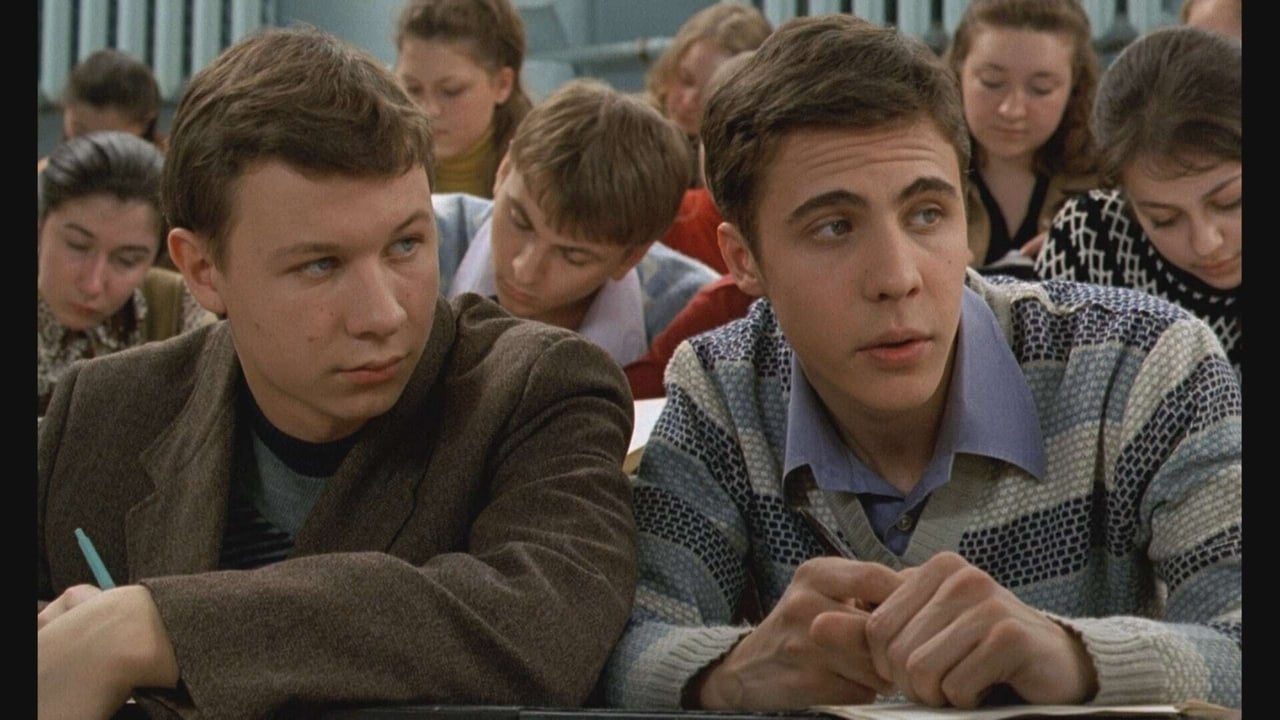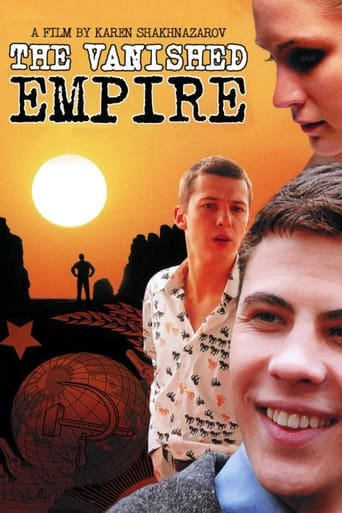Fairaher
The film makes a home in your brain and the only cure is to see it again.
AshUnow
This is a small, humorous movie in some ways, but it has a huge heart. What a nice experience.
Portia Hilton
Blistering performances.
Brennan Camacho
Mostly, the movie is committed to the value of a good time.
Kirpianuscus
like many Russian films, Vanished Empire could be understand especially by the public from the East. for the small detail, for the life style , for the relations between characters, for a special form of poetry. in same measure, it is an universal story of a teenager. and the only ingredient who does difference by many other films about same theme is the atmosphere of Brezhnev era. the mixture of nostalgia and emotions, the adventures of a teenager and his desires, fragments of the universe of his family members, the way to discover his roots, the love story who seems be a misunderstood, the final dialogue and the beautiful performance of Aleksandr Lyapin - who not represents a surprise - are tools for define a time more than a biography. nothing new. only the flavor of a period . honest presented, realistic reproduced at the level of an age of searches. humor and crisis of an empire. and few scenes who are potential of gem.
Mike B
The story line in this film starts to wear thin after about 30-40 minutes. It takes place in the Soviet Union in the mid-70's and we get an interesting view of life there. There is a black-market, students are bored in the class-room and they listen to rock-and-roll.Unfortunately the story surrounding this is rather simple – boys are trying to meet girls with the usual results. The on-again off-again relationship between the two main protagonists became strained after the 2nd or 3rd break-up. It just becomes a little repetitive and boring. The acting is good but the story lacks any progression after the first 45 minutes.
FilmCriticLalitRao
Those who have been films by Russian director Karen Shakhnazarov will surely waste no time in recognizing certain similarities which exist in "Ischeznuvshaya Imperiya" and one of his old films "Kuryer" which was made in 1987.Both these films gives viewers outside of Russia a very basic yet subtle idea of what it takes to be a youngster in mighty Russia.Although music and young people can be found in both these films,it should be noted that these films must be analyzed using absolutely different ideological yardsticks.A word for those who have not seen old films by Karen Shakhnazarov.They should be requested to have an attentive look at them at the earliest in order to understand how Karen Shakhnazarov has nicely blended his love for music and Russian youth in most of his films.This is something which has given a distinct edge of lightness to the image of Russian cinema which has earned the dubious notoriety of following a recognizable pattern of serious,occult themes."The Vanished Empire" is a curious title which might induce funny ideas in inattentive viewers' heads but this film is only mildly critical of Russian state.The highlight of this film is its depiction of joys of friendship in true Russian style.If surprise end is any indication of a film's ingenuity then "The Vanished Empire" would surely win many a heart by being a truly heroic film showing the frustrations of hapless Russian youth.Film critic Lalit Rao interviewed MOSFILM studio CEO and Russian director Karen Shakhnazarov during a screening of this film at 13th International Film Festival of Kerala 2008 (IFFK) which organized a retrospective of his films.
RResende
I am Portuguese so, despite being born in the 80', i know a few things about a country trying to overcome its own memory. For those who don't know, Portugal was the late perpetrator in Europe of a fascist concept of "empire", a retro idea that stuck cultural life and true evolution for decades in some countries. It finished for us in the mid 70', but dealing with such a radical change of collective definition is something that drags to these days, watered by an upgrade in the Portuguese general living conditions, but still there.Now i think the Soviet experiment was probably more radical and fundamentalist to its populations than the Latin European fascisms. And it lasted longer. So, dealing with the radical shift towards a forced "western democracy" approach is probably a painful process for the ex soviet territories, mostly the russians. That's the frame where i place this specific picture. I watched it as an exorcism of past phantoms, but also a blinking melancholic eye to those days.The facts in the story, which is casual (it is here as a 'typical' repetitive case, in those days) all speak against what was happening in that regime in that context, but yet it avoids moralizing. No one is judged (unlike, for example, in "The lives of the others") and no one is innocent. It's a kind of approach that assumes that we must feel what was going on regardless of the upper political or power contexts that forged what we see. I accept that vision, i enjoyed it. The cinematic options here were fully coherent to what we saw, and from time to time i saw Tarkovsky here, who has much to do with how cinema bends memory. Nice to remember a social context, a certain youth i never got to know, and a certain kind of cinema that is sweet and sometimes (not this case) deep and life-altering.My opinion: 3/5 FantasPorto http://www.7eyes.wordpress.com

